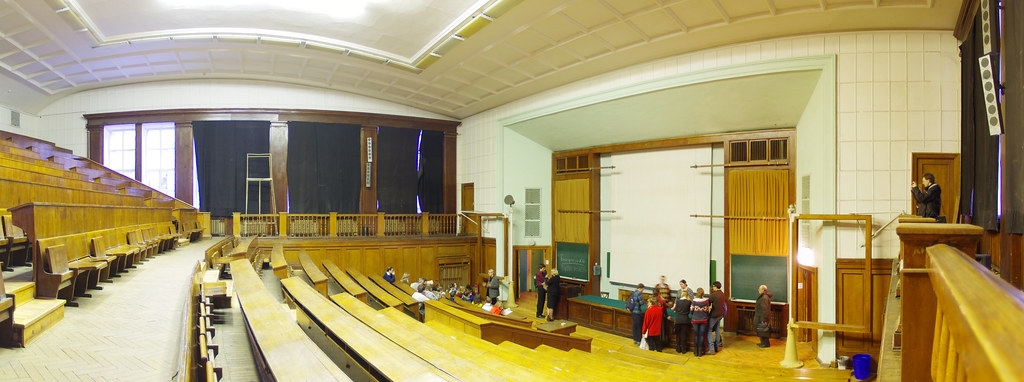Why are rectors paid so much but lecturers – so little?
Dmitry Dubrovsky
Photo: One of the latest innovations is to pay for lectures only after a whole lecture course has been completed by a professor. (Photo: Free photobank, CC BY-NC-SA 2.0, bit.ly/2xhxNzu)
A rise in economic pressure on university instructors and scientists has become part of the reform of Russian science and education. On the one hand, ideas about meaning and mission of higher education are changing but, on the other hand, institutions supposed to protect university’s employees, particularly in a situation when the employees’ socio-economic rights are violated, are too weak to rise to the challenge.
What Happens to the Salaries of Instructors and Their Bosses?
Pavel Kudyukin, the leader of the independent trade union “University Solidarity” calls the main economic challenges that employees working at a university face today, these challenges are: increase in (1) workload, (2) the number of students, and (3) classroom hours. Salaries of university instructors remain low, but in fact, due to the inflation and the rise in workload they are even decreasing. Taking into account additional rates, administrative work, etc. incomes from teaching at universities reach 40-60 th. rubles per month, or almost 500-700 th. rubles per year.
With this, the earnings of rectors and vice-rectors often move in the opposite direction compared to teaching staff. In income statements for 2018 submitted by the rectors of state universities annually, the figures vary greatly. On average it is 6.8 million rubles per year. The maximum income of 236 million rubles was the income of the rector of Mining University.
We are talking about the total income, which is sometimes not directly related to work at the university. Often a salary at the university is a small part of all payments. For example, the rector of Mining University, whose income was the highest, actually had the salary of 570 th. rubles per month that is 6.84 million rubles per year. The salary and bonuses of the rector of the RANEPA amounted to 10.5 million rubles per year; the rector of the Higher School of Economics had 11 million.
“Relatively Honest Ways” to Increase Salaries
A study by the independent trade union “University Solidarity” showed that real payments in 2017 did not coincide with the official data. “The administration of higher educational institutions often has recourse to various kinds of “tricks to comply with the formal requirements of the decree” (here the May decree of President Putin, 2012).
Various “tricks” are used to bring real salaries up to those required by this decree. For example, as Andronik Arutyunov, the co-chairman of the trade union, claims, an instructor is simply transferred from a full-time job to a part-time job. As a result, his/her formal full-time salary increases.
Another example is when a salary of a vice-rector is used as a statistical coefficient in calculating the average salary, and the latter, consequently, will be growing up.
Such data manipulation is also confirmed by Oleg Smolin, the first deputy chairman of the State Duma Committee on Education.
Such “games with figures” make it clear where the serious discrepancies between the official and real levels of salaries come from. If the average salary of university instructors in 2019, according to Rosstat, accounted for 85 th. rubles, then according to the portal trud.com , it was slightly more than 30 th. rubles per month.
Rectors Do Not Violate Anything
The difference between the salary of a rector and the salaries of instructors seems to remain quite high and varies depending on the university ranking. For example, the salary of the rector of Adyghe State University is 189 th. rubles per month, whereas the salary of the vice-rector at the same university reaches 138 th. rubles. At the same time, the average official salary of instructors there is 27.3 th. rubles.
Significantly, on the Job Search website Indeed, the average salary of an instructor at this university is indicated completely different – 11 215 rubles. (“These figures were taken from 6 employees, users, and job vacancies posted on Indeed over the past 36 months.”)
But this is not official data. Besides, this might be the salary of the instructor who has just started a career. In any case, it is too far from the average salary, according to Rosstat. Officially, the gap between the earnings of instructors and rectors cannot exceed the corner stone figure of 8. The Ministry of Education and Science clarifies: “The formula used to calculate salaries of rectors fixes the marginal multiplicity of the ratio of the average salary of the head of an institution and the average salary of its employees.”
Salaries vs Income
The main gap is not between salaries but in income. Published data show that the declared income is very different from the level of salaries. No rector officially violates the stated regulations, which say that the average salary of a rector shall not exceed the average salary of an instructor by more than eight times.
However, the gap in incomes is very huge. Even the head of Moscow State University, Viktor Sadovnichy, who looks relatively modest against the other rectors from Moscow and St. Petersburg universities, declared the income for 2016 as 16.5 million rubles, and for 2018 – 18.5 million.
Of these, 13.4 million Sadovnichy earned at Moscow State University. Then, he earned 21 th. rubles per month for a part-time job as the head of the Department at one of the Faculties at Moscow State University.
Based on these data, the full-time position, for example, the head of the department at Moscow State University – the leading university of Russia – allows to earn 42 th. rubles, or half a million per year. This is 26 times less than the income of the rector of Moscow State University. The income of the head of the department includes:
- a salary
- a percentage from extra-budgetary funds earned by the department,
- encouraging payments, which sometimes amount to hundreds of thousands of rubles per month.
Thus, the real gap between professors and instructors, on the one hand, and the rectorate, on the other, is very large. Though, formally the legislation is not violated. An important note: the gap between the earnings of top managers and employees is quite large not only at universities. And in Russia as a whole, this gap is much bigger than in other countries.
As the Official Figures Indicating the Growth Look Like
It cannot be said that the low salaries of university professors do not bother officials. The efforts to implement Vladimir Putin’s “May decrees” have led to an increase in the salaries of scientists, inter alia instructors of universities. According to the official reports, the average salary of scientists amounted to 264% of the average salary in Russia.
As for universities, according to the official reports of the Accounts Chamber for 2018, the declared salary increase of 200% did not happen in 45 educational institutions out of 209 that had been audited.
However, why do we have such huge growth in figures?
Increasing Workload as a Means of Implementing Decrees
It seems that we are talking about a special approach of implementing the “May decrees”. This practice began back in 2013: under conditions when the budget was absent that would have allowed such a sharp increase in salaries, the universities began not only to drastically reduce the number of instructors but also increase a workload for those who remained. This made it possible to increase salaries quite significantly – but, actually, it was only “paper-based fact”.
The unrest from instructors is successfully controlled by the terms on which contracts are often concluded.
So-called “effective contract” (usually it is short-term and encumbered with numerous requirements) was officially declared as “a means of improving the salary system, motivating instructors to conduct scientific research and “harmonizing” the relationship between employees and administration.”
Such a contract contains very tough terms. These terms are associated with both encouraging payments – often a solid part of earnings, and with the possibility for the contract to be prolonged.
According to the contract, instructors commit to:
- receive external grants and run them as a project – scientific or educational (the task is not easy considering the common reduction of funding for science),
- write incredible number of scientific papers – with further publishing them in highly cited journals,
- take on increased teaching hours.
This inevitably leads to a drop in either the quality of education or the depth and validity of publications.
Recent novelties – in particular, a lecture contract, which is paid AFTER giving the whole course (this is happening now at St. Petersburg University) – further complicate the economic situation of instructors.
Financial losses caused by a salary reduction are proposed, in particular, to be compensated by voluntary educational offers. That means providing additional lectures to students on the voluntary-payment base where the payments will come from a pocket of students. In this case, an instructor gives more teaching hours that takes time and results in the low possibility to do duly other responsibilities, although it, at the same time, takes off financial commitments from the university.
Failure to comply with the contract requirements results in sanctions – from remarks to reprimand. As a result, there is a possible non-renewal of a contract, which is short-term in most cases it is one-year.
Efficient Contracts are Being Limited
The muted critics caused by efficient contracts, and a staff turnover as a consequence of it, have not gone unnoticed.
Irina Rukovishnikova, the member of the Federation Council Committee on Constitutional Legislation and State Building, stated: “at the beginning of the year this practice is considered a violation of the rights of instructors. Effective contracts are relevant only when working with part-time or novice instructors. Long-term planning and effective development of the university in such a situation is impossible.”
This position was supported by Leonid Ivanov, the head of the Trade Union at St. Petersburg State University: frequent changes in teaching staff are not good for training young specialists, only because their mentors are changed too often.
Given the increasingly louder-sounding criticism, the Ministry of Education and Science of the Russian Federation planned to check the content and practice of applying effective contracts in the field of education by the end of April. Probably, due to the global changes caused by COVID-19, the solution to the issue will be postponed.
Nevertheless, universities have already been recommended to limit the practice of concluding short-term contracts.
All Instructors Receive “Subordinate Status”
Worsening of the economic rights of university professors/instructors also affects the basic organizational principles of the university. The status of teaching staff is changing – a process that researchers call precarization of the academic community.
The change in status means a major change in the demand for academic freedom. Researchers and instructors receive “the status of a subordinate, deprived of the right to make independent decisions in the field of professional activity.” They become “a screw” of the educational machine, no longer solving only private and economic issues, but, above all, filling the state order aimed at organizing a strictly regulated system for training students.”
Dmitry Dubrovsky holds a Ph.D. in Historical Science. He is an Associate Professor at the Higher School of Economics (Moscow), a Research Fellow at the Center for Independent Sociological Research (St. Petersburg), and a member of the St. Petersburg Human Rights Council.





0 Comments